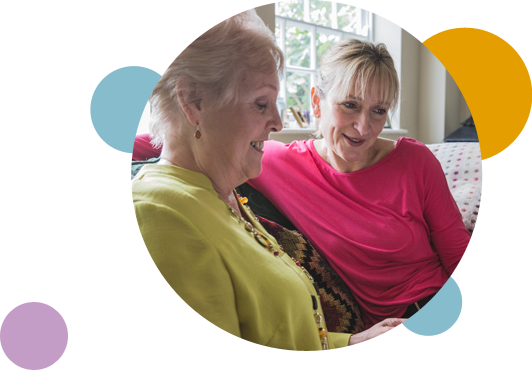What is sundowning in dementia?
Sundowning is a term used in dementia care that refers to changes in a person’s behaviour in the evening, around dusk. Those that are living with dementia experience an increasing sense of anxiety and agitation around this time. There are many reasons why sundowning occurs. By the end of the day a person living with dementia will be tired, and this may lead to the symptoms worsening. As darkness falls, some people with dementia become increasingly concerned they are in the wrong place, again leading to exacerbated symptoms. Physical pain, hunger and thirst can also play their part in dementia with sundown syndrome.

What causes sundowning?
The reasons sundowning occurs are not well understood. Sundowning is likely the result of a wide range of different causes.
It can be helpful to try and identify which of these issues may be contributing to your loved one’s sundowning symptoms, as each issue will require a different solution.
Some of the causes of sundowning include:
- Pain, hunger, thirst or other unmet needs
- Not enough exposure to sunlight during the day
- Disturbance to a person’s circadian rhythm, also known as the body’s ‘internal clock’
- Overstimulation during the day
- Sensory impairment such as hearing or vision loss
- Side effects of medication
- Anxiety or depression
- A lack of peaceful sleep
What are the symptoms of sundowning?
Sundowning symptoms generally start with an overwhelming feeling that something is wrong. Typically the person living with dementia feels they are in the wrong place. They may have a feeling of needing to go home or there is something they need to do, like meeting their husband from work even if that is not the case. These feelings can result in confusion and disorientation which may then cause the person to become agitated or start pacing.
Sundowning affects people in different ways, but some common symptoms include:
- Confusion
- Restlessness
- Wandering
- Anger or agitation
- Hallucinations
- Paranoia
- Insomnia or trouble sleeping
How to support someone with sundowning in dementia
There are some practical things you can do to support a person who is experiencing sundowning as it happens:
- Use distraction techniques – turn some music on, suggest you go for a walk, go into a different room to do something else with them, make a drink or food.
- Provide reassurance by holding the person’s hand or sit close to them and stroke their arm. These soothing techniques can make them feel great comfort.
- Talk in a slow and soothing way.
- Ask the person to tell you what the matter is – listen carefully and seek to deal with the source of their distress in a positive way.
There are also some useful tips to prevent sundowning:
By having a strong understanding of the person’s likes and dislikes, and what they enjoy you can build an evening route with activities they want to engage in – watching a film for example.
If you have the radio or television on try to ensure it is something calming, and relatively quiet as sudden loud noises can be upsetting for a person experiencing sundowning.
When evening starts, adapt how you speak to the person living with dementia – speak in shorter sentences and limit the time that you give instructions to avoid them becoming confused.
Large meals are not advisable in the evening as they can impact a person’s ability to sleep. Some drinks like coffee and alcohol are not advisable with sundowning, again because they disrupt sleep patterns. Limit naps during the day or eliminate completely so the person is ready to sleep at the right time.
Stick to a set routine during the day that contains activities that the person who is sundowning enjoys. Ensure they get enough exercise to promote positive well-being and self-esteem.
Closing the curtains and staring the night-time routine before dusk can help with the transition to night-time for a person who is experiencing sundowning symptoms.
Reflections from mirrors or glass can be confusion to someone with dementia so if possible, cover these.
Care at home for sundowning dementia
We know receiving care in the comfort, safety and familiarity of your own home has far-reaching benefits in improving overall health and well-being for a person living with dementia and sundown syndrome.
Moving at any stage in life can be disruptive and stressful. When an individual is living with dementia with sundown syndrome the process of moving to a care home, away from their much-loved home full of its treasured possessions and memories can be really heart-wrenching and daunting, affecting their ability to live well with dementia.
We know that staying at home and receiving compassionate, one-to-one care from a highly trained and well-matched professional carer improves the quality of life and health outcomes for an individual with dementia. Our personalised approach to providing high-quality, live-in care with a fully-managed and flexible service that families can rely on is setting the standards in live-in care.
Specialist dementia care at home for sundowning
We have been innovating dementia care for over 10 years. All our professional carers are trained in how to care with someone living with dementia and experiencing sundowning dementia. They use a range of best practice techniques proven to provide reassurance, reduce anxiety and calm behaviours, whilst reducing the need to use anti-psychotic drugs used widely in many care home settings.
This means the person with dementia can live well, despite the challenges dementia can present at sundowning with the gentle encouragement and compassionate care provided by our dementia carers. The high-quality care provided by our dementia carers has seen a 66% reduction in the use of antipsychotic medications compared with the average care home.
Our collaborative approach to working with leading medical experts, academic bodies and leading charities ensure our care is of the very highest standards. This helps us to understand and discover what is important to the person living with dementia, enabling us to develop a purposeful and meaningful programme of care.
All our professional carers are trained in dementia care and our management team complete a higher-level dementia care training programme. It does not stop there. Our care teams receive on-going coaching, mentoring and support based on latest thinking and research that ensure they have the knowledge, skills and aptitude to deliver positive dementia care.
We adopt a blended approach to delivery of dementia care, led and supported by our own Consultant Admiral Nurse. The support from an Admiral Nurse, working with leading dementia charity, Dementia UK means we can offer unrivalled levels of emotional and practical support based on best practice care for sundowning dementia.
Useful resources
To support you and your family we have created a useful Dementia Care Guide which provides you with information and advice on how to provide person-centred dementia care following a diagnosis of dementia. There is also a number of dementia charities across the UK who provide families with help, advice and support when they need it most, including Dementia UK and the Alzheimer’s Society. The NHS has a useful living well with dementia guide that provides practical tips and guidance so people living with dementia can live a fulfilling life.
Sundowning in dementia faqs
- What is Sundowning?
Sundowning in dementia is a change in a person’s behaviour that occurs in the late afternoon or evening. During this time, a person living with dementia may experience distressing symptoms such as agitation, confusion or restlessness.
- In What Stage of Dementia Does Sundowning Occur?
Sundowning symptoms usually occur throughout the mid to late stages of dementia, but this will vary from person to person.
- Can You Experience Sundowning Without Dementia?
While sundowning is most often associated with dementia, the symptoms of sundowning can also occur in older people without dementia.
- How Long Does Sundowning in Dementia Last?
When a sundowning episode occurs, it can last for several hours or through the night. This can prevent the person with dementia and their caregivers from enjoying a peaceful night’s rest.

Other conditions we care for
Talk to us about your dementia care needs
Our friendly and experienced team is here to help you and your family make sense of the options available to you. Call us today – we will help you every step of the way.

